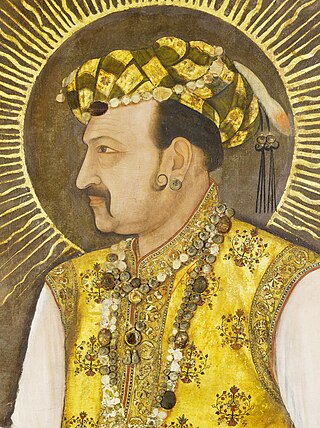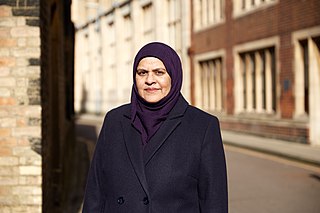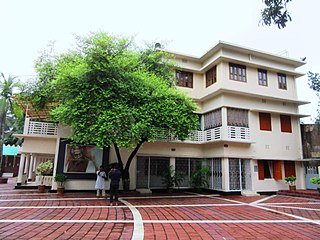
Nur-ud-Din Muhammad Salim, known by his imperial name Jahangir, was the fourth Mughal Emperor, who ruled from 1605 till his death in 1627.

A lascar was a sailor or militiaman from the Indian subcontinent, Southeast Asia, the Arab world, British Somaliland or other lands east of the Cape of Good Hope who was employed on European ships from the 16th century until the mid-20th century.

British Asians are British people of Asian descent. They constitute a significant and growing minority of the people living in the United Kingdom, with a population of 5.76 million people or 8.6% of the population identifying as Asian or Asian British in the 2021 United Kingdom census. This represented an increase from a 6.9% share of the UK population in 2011, and a 4.4% share in 2001.

Netaji Subhas Chandra Bose: The Forgotten Hero is a 2004 Indian epic biographical war film, written and directed by Shyam Benegal. The film starred an ensemble cast of Sachin Khedekar, Kulbhushan Kharbanda, Rajit Kapur, Arif Zakaria, and Divya Dutta, among others. The film depicts the life of the Indian Independence leader Subhas Chandra Bose in Nazi Germany: 1941–1943, and In Japanese-occupied Asia 1943–1945, and the events leading to the formation of Azad Hind Fauj.

Sylheti Nagri or Sylheti Nāgarī, known in classical manuscripts as Sylhet Nagri as well as by many other names, is an Indic script of the Brahmic family, used to write the Sylheti language. The script was historically used in areas of Bengal and Assam that were east of the Padma, primarily in the eastern part of the Sylhet region, to document Muslim religious poetry known as puthis; having no presence in formal documentations. In the course of the 20th century, it has lost much ground to the standardised Eastern Nagari script. Printing presses for Sylheti Nagri existed as late as into the 1970s, and in the 2000s a Unicode font was created for the script.

British Bangladeshis are people of Bangladeshi origin who have attained citizenship in the United Kingdom, through immigration and historical naturalisation. The term can also refer to their descendants. Bengali Muslims have prominently been migrating to the UK since World War II. Migration reached its peak during the 1970s, with most originating from the Sylhet Division. The largest concentration live in east London boroughs, such as Tower Hamlets. This large diaspora in London leads people in Sylhet to refer to British Bangladeshis as Londoni.
Bangladeshis are one of the largest immigrant communities in the United Kingdom. Significant numbers of ethnic Bengali peoples, particularly from Sylhet, arrived as early as the seventeenth century, mostly as lascar seamen working on ships. Following the founding of Bangladesh in 1971, a large immigration to Britain took place during the 1970s, leading to the establishment of a British Bangladeshi community. Bangladeshis were encouraged to move to Britain during that decade because of changes in immigration laws, natural disasters such as the Bhola cyclone, the Bangladesh Liberation War against Pakistan, and the desire to escape poverty, and the perception of a better living led Sylheti men bringing their families. During the 1970s and 1980s, they experienced institutionalised racism and racial attacks by organised far-right groups such as the National Front and the British National Party.

Daud Khan Karrani was the last ruler of Bengal's Karrani dynasty as well as the final Sultan of Bengal, reigning from 1572 to 1576. During the reign of his father Sulaiman Khan Karrani, Daud commanded a massive army of 40,000 cavalry, 3,600 elephants, 140,000 infantry and 200 cannons.

Suzana Ansar is an English singer, actress and television presenter of Bangladeshi descent.

The Sylheti or Sylhetis are an Indo-Aryan ethnocultural group that are associated with the Sylhet region. There are strong diasporic communities in Barak Valley of Assam, India, North Tripura, as well as in rest of Bangladesh and northeast India. They speak Sylheti, an Eastern Indo-Aryan language that is considered "a distinct language by many and a dialect of Bengali by some others".

Shahidun Nessa Rahman, commonly known by her pseudonym Shahida Rahman, is an English author, writer and publisher. She is best known as the author of Lascar.

Richard Norman Everitt was a 15-year-old boy who was stabbed to death in London, England. Everitt's neighbourhood, Somers Town, had been the site of ethnic tensions. He was murdered by a gang of British Bangladeshis who were seeking revenge against another white boy.

The Sheikh family of Tungipara is one of the two most prominent Bangladeshi political families, other being the Zia family. The family primarily consists of Sheikh Mujibur Rahman, Sheikh Hasina, Sheikh Rehana and their relatives. Their political involvement has traditionally revolved around the Bangladesh Awami League.

The Greater Sylhet region predominantly included the Sylhet Division in Bangladesh, and Karimganj district in Assam, India. The history of the Sylhet region begins with the existence of expanded commercial centres in the area that is now Sylhet City. Historically known as Srihatta and Shilhatta, it was ruled by the Buddhist and Hindu kingdoms of Harikela and Kamarupa before passing to the control of the Chandra, Sena and Deva dynasties in the early medieval period. After the fall of these Buddhist and Hindu principalities, the region became home to many more independent petty kingdoms such as Jaintia, Gour, Laur, and later Taraf, Pratapgarh, Jagannathpur, Chandrapur and Ita. After the Conquest of Sylhet in the 14th century, the region was absorbed into Shamsuddin Firoz Shah's independent principality based in Lakhnauti, Western Bengal. It was then successively ruled by the Muslim sultanates of Delhi and the Bengal Sultanate before collapsing into Muslim petty kingdoms, mostly ruled by Afghan chieftains, after the fall of the Karrani dynasty in 1576. Described as Bengal's Wild East, the Mughals struggled in defeating the chieftains of Sylhet. After the defeat of Khwaja Usman, their most formidable opponent, the area finally came under Mughal rule in 1612. Sylhet emerged as the Mughals' most significant imperial outpost in the east and its importance remained as such throughout the seventeenth century. After the Mughals, the British Empire ruled the region for over 180 years until the independence of Pakistan and India. There was a complete list of the different amils who governed Sylhet which was recorded in the office of the Qanungoh of Sylhet. However, most complete copies have been lost or destroyed. Dates from letters and seal traces show evidence that the amils were constantly changed. In 1947, when a referendum was held, Sylhet decided to join the Pakistani province of East Bengal. However, when the Radcliffe Line was drawn up, Karimganj district of Barak Valley was given to India by the commission after being pleaded by Abdul Matlib Mazumdar's delegation. Throughout the History of Sylhet, raids and invasions were also common from neighbouring kingdoms as well as tribes such as the Khasis and Kukis.
Ayub Ali Master, was an early British Bangladeshi social reformer, politician and entrepreneur. He is notable for pioneering social welfare work for many early British Asians. He established a boardinghouse known as "Number 13" in his home which provided many facilities for British Asians. He is one of the earliest of Sylhetis to arrive in the United Kingdom, now hosting one of the largest Bangladeshi diaspora communities outside of Bangladesh and due to this, he was amongst the famous household names in the Sylhet region during his time referred to as the brave jahazis (sailors). His family is also notable as entrepreneurs and businessmen.
Shah Abdul Majid Qureshi, also known by his daak naam Moina Meah, was an early British Bangladeshi restaurateur and social reformer. He is notable for being involved in the early politics of British Asians and pioneering social welfare work for the working-class diaspora in the United Kingdom. He claimed to be the first Sylheti to own a restaurant in the United Kingdom. One of his later restaurants, India Centre, often provided facilities and was a location where important meetings were held by the India League attracting the likes of Subhas Chandra Bose and V. K. Krishna Menon.
Aftab Ali was an early 20th-century Pakistani Bengali social reformer, politician and entrepreneur. His work is recognised to have helped thousands of British Asian lascars to migrate, settle and find employment in Britain. He was a member of the Bengal Legislative Assembly and National Assembly of Pakistan, and served as the first Minister of Labour for East Pakistan.

The zamindars of Mahipur were a Bengali aristocratic family of feudal landowners. The zamindari estate encompassed the Chakla of Qazirhat under the Cooch Behar State since the Mughal period. Although their aristocratic status was lost with the East Bengal State Acquisition and Tenancy Act of 1950, the Mahipur estate remains an important part of the history of Rangpur and belongs to one of the eighteen ancient zamindar families of Rangpur. The zamindari palace was lost as a result of flooding from the Teesta River, although the mosque, cemetery, polished reservoir and large draw-well can still be seen today.














